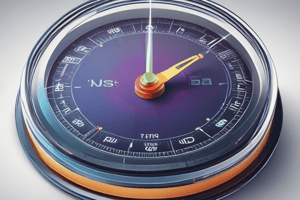Podcast
Questions and Answers
In which state of matter do particles have the least cohesive and dense properties?
In which state of matter do particles have the least cohesive and dense properties?
- Solid
- Plasma
- Gas (correct)
- Liquid
Which state of matter has molecules that move more freely than in solid materials, but less freely than in gases?
Which state of matter has molecules that move more freely than in solid materials, but less freely than in gases?
- Solid
- Plasma
- Liquid (correct)
- Gas
What is the most distinguishing characteristic of a solid state of matter?
What is the most distinguishing characteristic of a solid state of matter?
- Particles spreading in every direction
- Easily compressible
- Limited movement of particles (correct)
- Ability to take the shape of the container
How is the volume of an irregular object measured?
How is the volume of an irregular object measured?
What change occurs when a liquid turns into a solid state?
What change occurs when a liquid turns into a solid state?
What is the distinctive characteristic of liquids regarding their shape?
What is the distinctive characteristic of liquids regarding their shape?
What is the primary property that defines matter according to the passage?
What is the primary property that defines matter according to the passage?
How is the mass of an object typically measured according to the passage?
How is the mass of an object typically measured according to the passage?
What is the relationship between an object's mass and weight as described in the passage?
What is the relationship between an object's mass and weight as described in the passage?
According to the passage, how is the volume of a liquid typically measured?
According to the passage, how is the volume of a liquid typically measured?
What is the relationship between the volume of a cubic centimeter (cm^3) and a milliliter (ml) as described in the passage?
What is the relationship between the volume of a cubic centimeter (cm^3) and a milliliter (ml) as described in the passage?
Flashcards are hidden until you start studying




